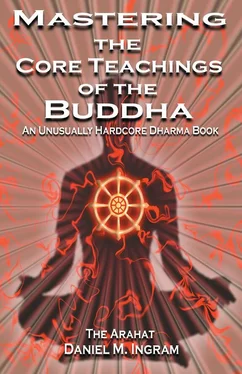Daniel Ingram - Mastering the Core Teachings of Buddha - An Unusually Hardcore Dharma Book
Здесь есть возможность читать онлайн «Daniel Ingram - Mastering the Core Teachings of Buddha - An Unusually Hardcore Dharma Book» весь текст электронной книги совершенно бесплатно (целиком полную версию без сокращений). В некоторых случаях можно слушать аудио, скачать через торрент в формате fb2 и присутствует краткое содержание. Год выпуска: 2009, ISBN: 2009, Издательство: Aeon Books, Жанр: Старинная литература, на русском языке. Описание произведения, (предисловие) а так же отзывы посетителей доступны на портале библиотеки ЛибКат.
- Название:Mastering the Core Teachings of Buddha - An Unusually Hardcore Dharma Book
- Автор:
- Издательство:Aeon Books
- Жанр:
- Год:2009
- ISBN:9781904658405
- Рейтинг книги:5 / 5. Голосов: 1
-
Избранное:Добавить в избранное
- Отзывы:
-
Ваша оценка:
- 100
- 1
- 2
- 3
- 4
- 5
Mastering the Core Teachings of Buddha - An Unusually Hardcore Dharma Book: краткое содержание, описание и аннотация
Предлагаем к чтению аннотацию, описание, краткое содержание или предисловие (зависит от того, что написал сам автор книги «Mastering the Core Teachings of Buddha - An Unusually Hardcore Dharma Book»). Если вы не нашли необходимую информацию о книге — напишите в комментариях, мы постараемся отыскать её.
Mastering the Core Teachings of Buddha - An Unusually Hardcore Dharma Book — читать онлайн бесплатно полную книгу (весь текст) целиком
Ниже представлен текст книги, разбитый по страницам. Система сохранения места последней прочитанной страницы, позволяет с удобством читать онлайн бесплатно книгу «Mastering the Core Teachings of Buddha - An Unusually Hardcore Dharma Book», без необходимости каждый раз заново искать на чём Вы остановились. Поставьте закладку, и сможете в любой момент перейти на страницу, на которой закончили чтение.
Интервал:
Закладка:
The suffering of the ordinary world can be extremely unpredictable, and working to relieve it is a very complex business, the work of a 54
The Three Trainings Revisited
lifetime and perhaps an eternity. The suffering related to being unable to access refined altered states of consciousness is mitigated by simply taking the time to learn the skills necessary and then refining them until they are accessible to us when we wish. There are limits to these states, and so the basic states attainable by training in concentration can be very thoroughly mastered within a lifetime and even within a few years or perhaps months for those with talent and diligence. The stages of enlightenment are permanent, and once they are attained, that aspect of our suffering is forever eliminated and never arises again. This can be accomplished by those who take the time to learn the skills necessary to see individual sensations clearly and are willing to work on that level.
These basic facts can be used to help us plan our quest for
happiness and the elimination of the various forms of suffering in our life. We can direct our studies, our training, and work on specific skills that lead to specific effects and abilities in the order we choose, within the limits of our life circumstances and the resources available to us. For instance, it might make sense to learn concentration skills early in our life, as they cultivate so many of the skills necessary for the other two trainings and can provide increased sense of ease and wellbeing. For example, rather than popping a cold beer at the end of a hard day, we could bathe our body and mind in as much bliss and peace as we can stand for as long as we wish. If we master concentration practices, we have the option to make such choices.
It might also make sense to work on insight practices early rather than later so as to reduce the amount of time during our life that we live with the fundamental suffering caused by the illusion of duality. There is only so much we can do to prevent ordinary suffering for ourselves and others, though it is always good to do what we can. Thus, it is also good to realize that we can also reduce and eliminate the other forms of suffering through learning the two basic styles of meditation more easily than we can eliminate much of our conventional suffering.
There are three ways in which words such as “enlightenment” are used, and these may also relate to the scopes of the Three Trainings.
However, I feel that this is a dangerous habit, and I strongly advocate using enlightenment and similar words to refer only to ultimate insights, meaning the stages of awakening in the high and traditional sense.
55
The Three Trainings Revisited
While we may hear people speak of committing “enlightened” actions, or of thinking in “enlightened” ways, I have come to the conclusion that for spiritual training we either need to be very careful to explain that these are very conventional and relative definitions of enlightenment or not use such language at all.
Some traditions give some of the very high concentration states an ultimate status. I also advocate strongly against this, as did the Buddha.
These states are so compelling and seductive for some people that they imagine they are enlightened in the non-dual sense when they are merely having temporary unitive or unknowing experiences
(experiences where reality did something that was sufficiently lacking in specific qualities or intensity to be clearly known). Thus, I strongly suggest that such attainments never be associated with the language of enlightenment in any way.
Thus, I define enlightenment as permanently eliminating the basic perceptions that either duality or unity is the answer, and thus attaining to permanent non-dual realizations that are unshakable. It has nothing whatsoever to do with how things manifest and everything to do with some basic understanding of those things. I devote an entire chapter to explaining this more fully, but it is important for the discussion in between here and there to have been introduced to the strict and formal definition of enlightenment that I will be using.
These frameworks can also be useful for looking at other common issues such as thoughts of past and future that people run into when they get into meditation. Confusion arises when these pieces of advice are applied outside of the scope for which they were meant.
When working on our ordinary lives, i.e. within the scope of the first training, the content of our thoughts on past and future is very helpful, in fact absolutely necessary. With experience we generate a body of memory of what leads to what in this world, and with our predictive ability we can use this to try to craft a well-lived life, however we define that. However, when working on training in concentration, such thoughts are generally ignored or suppressed by deep concentration on another object. When doing insight practices, it doesn’t matter so much if thoughts of past or future arise, so long as we ignore their content, notice that they occur now, and notice the true nature of the individual 56
The Three Trainings Revisited
sensations that make up those thoughts. It is common to hear of people trying to apply one piece of advice to a scope for which it was never intended, like trying to stop thinking when trying to deal with their daily life. This sort of practice would simply promote stupidity, and there is already more than enough of that. In short, when evaluating or applying a piece of spiritual advice, make sure you understand the specific context for which it was designed.
I thought it would be fun to envision the Three Trainings as characters and have them critique each other and then talk with each other about ways that they could reinforce each other. I will do this in the form of a short play in one act. While I will exaggerate and dichotomize their issues with each other for comic effect, I do think that each of the points made has some validity. Hopefully, you will see through the humor to the important points being illustrated.
Curtain opens. Morality, Concentration and Insight are sitting in a bar having a discussion. A large stack of empty shot glasses sits in front of each character.
Morality: You navel gazing, self-absorbed, good-for-nothing freaks! I go out and work hard all day long to make this world fit to live in while you two sit on those sweat covered cushions and cultivate butt-rot! I go out and make good money, keep food in our mouths, a roof over our heads, deal with our stuff, and you go out and spend our money up at that freak-house you call a meditation center when there is important work to be done! I want to work on my tan!
Insight: Who are you calling “self-absorbed?” I can’t be self absorbed by definition! If it wasn’t for me, you would be so stuck in dualistic illusion that you wouldn’t know your ass from your elbow, you conceptually fixated, emotionally mired, bound-up-in-manifestation-looking, twelve sandwich eating…
Concentration: Yeah! And by the way, Mr. Oh-so-worldly, you
should learn to lighten up sometimes! Work your fingers to the bone, whaddaya get? Bony fingers. That’s what. And that goes for you too, Mr. Enlightenment! If you didn’t have my skills, you’d be shit out of luck, unable to focus, and dead boring to boot! Who brings up the deep joy and wondrous mind states around here? I do, that’s who, so you two should just shut up!
57
The Three Trainings Revisited
Insight: Oh, yeah? Well, Mr. La-la Land, if it weren’t for me, we’d be so caught up in your transient highs that we might just get arrested.
Somebody call the law! You two are so easily sucked into blowing things out of proportion that without me you two would have all the perspective of a dung heap!
Читать дальшеИнтервал:
Закладка:
Похожие книги на «Mastering the Core Teachings of Buddha - An Unusually Hardcore Dharma Book»
Представляем Вашему вниманию похожие книги на «Mastering the Core Teachings of Buddha - An Unusually Hardcore Dharma Book» списком для выбора. Мы отобрали схожую по названию и смыслу литературу в надежде предоставить читателям больше вариантов отыскать новые, интересные, ещё непрочитанные произведения.
Обсуждение, отзывы о книге «Mastering the Core Teachings of Buddha - An Unusually Hardcore Dharma Book» и просто собственные мнения читателей. Оставьте ваши комментарии, напишите, что Вы думаете о произведении, его смысле или главных героях. Укажите что конкретно понравилось, а что нет, и почему Вы так считаете.












